More grammar schools ‘will increase social mobility’, Conservative campaigners say
An influential Conservative pressure group today launched a campaign for a commitment to allow the creation of more grammar schools to be included in the party’s general election manifesto.
Grass-roots organisation Conservative Voice wants to overturn legislation preventing the opening of new grammars, which select pupils at 11 on the basis of exam performance.
The campaign has the backing of leading Tory MPs including former defence secretary Liam Fox, former leadership challenger David Davis and Graham Brady, chairman of the 1922 Committee of backbench Conservatives.
Don Porter, founder of Conservative Voice, said that around 70 MPs had already pledged support, with more expected to follow over the next few days.
Grammar schools provided an opportunity for children whose parents could not afford a private education to improve their prospects, he added.
“We see this as a vehicle for social mobility and we would look for the first wave to be in areas of social deprivation and underperformance in education,” Mr Porter explained.
But Margaret Tulloch from the pressure group Comprehensive Future, which campaigns for an end to selection, said the evidence suggested that selection widened the gap between rich and poor.
“You hear people saying, ‘I went to grammar school and I did well’, but you never hear people saying, ‘I failed the 11-plus and it was the best thing that ever happened to me’,” she said.
Legislation banning new grammars was passed by Tony Blair’s government, although existing schools are allowed to set up “satellites” in new locations.
Last month it emerged that two Cabinet ministers, home secretary Theresa May and defence secretary Michael Fallon, were backing the creation of new satellite grammar schools in their constituencies, in Berkshire and Kent respectively.
But in an interview earlier this week, education secretary Nicky Morgan said she was not convinced that selection at 11 was the best way to improve education or promote social mobility.
Around 4 per cent of all Year 7 pupils in England attend a grammar school. There are 164 grammars in total, divided between local authorities that operate widespread selection - such as Kent, Buckinghamshire, Slough and Trafford - and individual schools scattered around the country.
Research published by social mobility charity the Sutton Trust last year found that less than 3 per cent of pupils at grammar schools were entitled to free school meals, compared with 18 per cent in areas that operated selection.
Trust chairman Sir Peter Lampl said: “Our research shows grammar schools are still dominated by those from more advantaged backgrounds.”
The trust has called for increased outreach work to ensure pupils from low-income backgrounds sit the 11-plus and to make the tests as fair as possible. It has also argued that priority should be given to those children eligible for the pupil premium.
Related stories:
Grammar schools did not widen access to elite universities, study finds - 21 Nov 2014
Boris Johnson: decline of grammar schools is a ‘tragedy’ - 11 Nov 2014
Keep reading for just £1 per month
You've reached your limit of free articles this month. Subscribe for £1 per month for three months and get:
- Unlimited access to all Tes magazine content
- Exclusive subscriber-only stories
- Award-winning email newsletters




